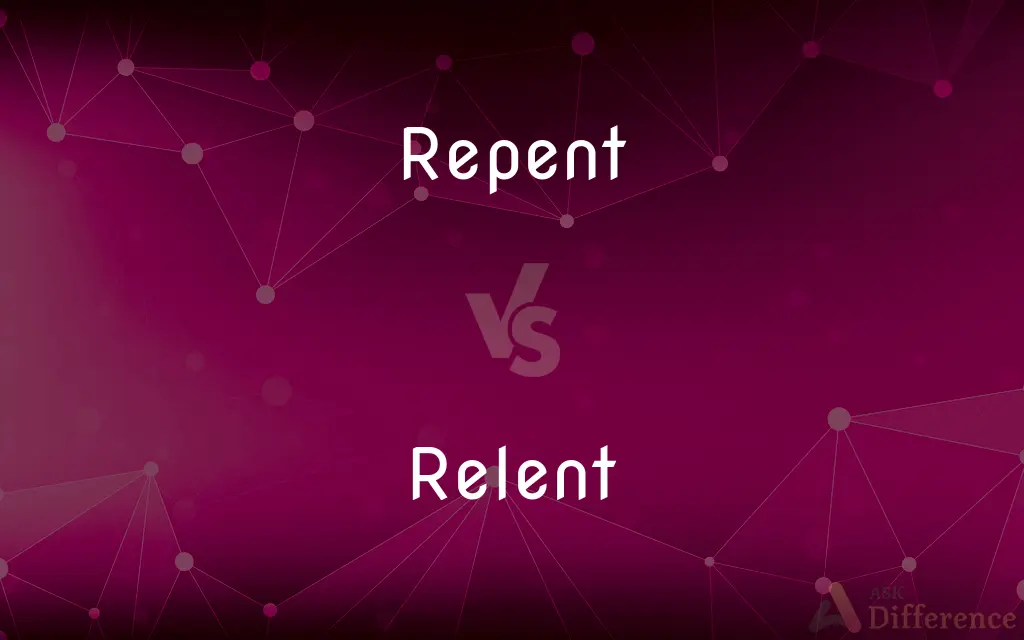Repent vs. Relent — What's the Difference?
By Urooj Arif & Fiza Rafique — Updated on March 13, 2024
Repent involves feeling remorse for one's actions, while relent is about softening in attitude or temper.

Difference Between Repent and Relent
Table of Contents
ADVERTISEMENT
Key Differences
Repentance is deeply associated with the feeling of remorse and the desire for change after recognizing one’s wrongdoings. It often carries a moral or spiritual connotation, suggesting a deep, internal transformation. Repenting is not just about acknowledging wrongdoing; it's about committing to change and seeking to make amends. On the other hand, relenting does not necessarily involve moral or ethical dimensions. To relent is to become less severe or harsh in one's stance, attitude, or actions. It is more about softening one's approach or giving in to something or someone after a period of resistance.
While repentance is a process that involves internal reflection, remorse, and a commitment to change, relenting is more about external actions and reactions. Repenting is a personal journey towards acknowledging faults and seeking to amend them, often driven by guilt or a sense of moral duty. Relenting, however, is influenced by external factors such as persuasion, compassion, or fatigue from resistance. It reflects a change in behavior or decisions, often in response to the actions or requests of others.
Repentance and relenting both involve a change, but the motivations and implications of these changes are distinct. Repentance is motivated by a desire to correct one's moral compass and align with ethical or spiritual values. It is introspective and rooted in personal growth. Relenting, in contrast, is often motivated by external pressures or a reevaluation of a situation, leading to a softer approach or concession.
In the context of relationships or conflicts, repentance can lead to healing and rebuilding of trust through sincere acknowledgment and correction of wrongs. Relenting, while it can ease tensions and resolve conflicts, does not inherently address the underlying issues or moral responsibilities as repentance does. It is more about the strategic or emotional decision to stop opposing than about ethical reflection.
The act of repenting is a deeply personal and often spiritual journey that reflects a commitment to moral and ethical growth. Relenting, while important in its own right, pertains more to adjustments in behavior, stance, or decisions in response to external circumstances or pressures. These differences highlight the distinct pathways through which individuals address personal flaws, conflicts, or decisions.
ADVERTISEMENT
Comparison Chart
Definition
Feeling remorse and seeking to change after recognizing wrongdoing.
Softening in attitude or stance, often due to persuasion or realization.
Motivation
Internal reflection and moral responsibility.
External pressures or reevaluation of circumstances.
Focus
Moral and ethical improvement.
Adjustment in behavior or decision-making.
Process
Introspective and involves personal commitment to change.
Reactive to external conditions or appeals.
Outcome
Personal growth and possibly making amends.
Resolution of conflict or cessation of resistance.
Compare with Definitions
Repent
A spiritual or religious act of seeking forgiveness and transformation.
In many religions, followers are encouraged to repent for their sins and seek a righteous path.
Relent
Softening one's stance or becoming less severe in response to others.
After seeing their determination, she relented and gave her approval.
Repent
An introspective journey motivated by guilt or moral duty.
He spent nights in repentance, vowing to correct his past mistakes.
Relent
Easing up on a previously rigid or harsh position.
The teacher relented on the assignment deadline after hearing the students' reasons.
Repent
Making a sincere effort to amend one's wrongs and improve oneself.
Realizing the error of his ways, he repented and sought to change.
Relent
Giving in or yielding after a period of resistance.
Despite initial resistance, he relented and allowed the changes to proceed.
Repent
Recognizing one's wrongdoing and committing to moral and ethical improvement.
She repented for her actions and worked to make amends.
Relent
A change of heart or attitude, often due to emotional or rational appeal.
Moved by their pleas, he relented and extended the deadline.
Repent
A process of feeling remorse and seeking to change one's ways.
After realizing the hurt his words caused, he repented for his harshness.
Relent
The act of becoming more lenient or compassionate.
She finally relented and agreed to their request for more time.
Repent
To feel remorse, contrition, or self-reproach for what one has done or failed to do; be contrite
"[He] liked to visit prisoners and admonish them to repent of their ways" (Adam Hochschild).
Relent
To become more lenient, compassionate, or forgiving.
Repent
To feel such regret for past conduct as to change one's mind regarding it
Repented of intemperate behavior. You'd better accept their offer before they repent.
Relent
To become less severe or intense; slacken
The storm finally relented.
Repent
To become a more moral or religious person as a result of remorse or contrition for one's sins.
Relent
Stay; stop; delay.
Repent
To feel regret or self-reproach for
Repent one's sins.
Relent
(obsolete) A relenting.
Repent
(Archaic) To cause (one or oneself) to feel remorse or regret
"And it repented the Lord that he had made man on the earth" (King James Bible).
Relent
(intransitive) To give in or be swayed; to become less hard, harsh, or cruel; to show clemency.
He had planned to ground his son for a month, but relented and decided to give him a stern lecture instead.
Repent
Prostrate or growing along the ground.
Relent
(intransitive) To slacken; to abate.
We waited for the storm to relent before we ventured outside.
He will not relent in his effort to reclaim his victory.
Repent
(intransitive) To feel pain, sorrow, or regret for what one has done or omitted to do; the cause for repenting may be indicated with "of".
Marry in haste, repent at leisure.
Relent
To lessen, make less severe or intense.
Repent
To be sorry for sin as morally evil, and to seek forgiveness; to cease to practice sin and to love.
Relent
To become less rigid or hard; to soften; to yield, for example by dissolving or melting
Repent
(transitive) To feel pain on account of; to remember with sorrow.
Relent
(obsolete) softhearted; yielding
Repent
(transitive) To be sorry for, to regret.
I repent my sins.
Relent
To become less rigid or hard; to yield; to dissolve; to melt; to deliquesce.
He stirred the coals till relente ganThe wax again the fire.
[Salt of tartar] placed in a cellar will . . . begin to relent.
When opening buds salute the welcome day,And earth, relenting, feels the genial ray.
Repent
To cause to have sorrow or regret.
Relent
To become less severe or intense; to become less hard, harsh, cruel, or the like; to soften in temper; to become more mild and tender; to feel compassion.
Can you . . . beholdMy sighs and tears, and will not once relent?
Repent
To cause (oneself) to feel pain or regret.
Relent
To slacken; to abate.
And oftentimes he would relent his pace.
Repent
Creeping along the ground.
Relent
To soften; to dissolve.
Repent
Prostrate and rooting; - said of stems.
Relent
To mollify ; to cause to be less harsh or severe.
Repent
Same as Reptant.
Relent
Stay; stop; delay.
Nor rested till she came without relentUnto the land of Amazons.
Repent
To feel pain, sorrow, or regret, for what one has done or omitted to do.
First she relentsWith pity; of that pity then repents.
Relent
Give in, as to influence or pressure
Repent
To change the mind, or the course of conduct, on account of regret or dissatisfaction.
Lest, peradventure, the people repent when they see war, and they return to Egypt.
Repent
To be sorry for sin as morally evil, and to seek forgiveness; to cease to love and practice sin.
Except ye repent, ye shall likewise perish.
Repent
To feel pain on account of; to remember with sorrow.
I do repent it from my very soul.
Repent
To feel regret or sorrow; - used reflexively.
My father has repented him ere now.
Repent
To cause to have sorrow or regret; - used impersonally.
Repent
Turn away from sin or do penitence
Repent
Feel remorse for; feel sorry for; be contrite about
Common Curiosities
What does it mean to relent?
To relent is to soften in one's stance or attitude, often as a result of persuasion or reconsideration.
Can someone repent without relenting?
Yes, one can feel remorse and seek to change without necessarily softening their stance on a specific issue.
What does it mean to repent?
Repentance involves feeling remorse for one's actions and making a committed effort to change and improve.
Can someone relent without repenting?
Yes, it's possible to soften one's stance or give in to something without feeling remorse or seeking personal change.
What drives a person to relent?
Factors such as persuasion, compassion, realization of facts, or simply weariness from resistance can lead someone to relent.
Are repentance and relenting the same?
No, repentance involves a moral or ethical dimension of remorse and change, while relenting focuses on softening one's approach or stance.
Is repentance always related to religion?
While often associated with religious practices, repentance can also be a secular process of acknowledging wrongs and seeking to improve.
How does society view repentance and relenting?
Views vary widely, but both are generally seen as positive steps towards resolution, improvement, or reconciliation.
Can relenting lead to personal growth?
While primarily focused on changing behavior in response to external factors, relenting can also lead to personal insights and growth.
Does relenting imply weakness?
Not necessarily; relenting can be a strategic or compassionate choice rather than a sign of weakness.
How does repentance affect personal growth?
Repentance can lead to significant personal growth by fostering self-awareness, humility, and a commitment to ethical living.
Can relenting resolve conflicts?
Yes, relenting can help resolve conflicts by easing tensions and showing willingness to compromise or reconsider.
What is the role of forgiveness in repentance?
Forgiveness, whether from others or oneself, is often a crucial aspect of the repentance process, aiding in healing and transformation.
Is repentance a one-time act?
Repentance can be a continuous process of self-improvement and reflection, not just a one-time act.
What are the signs of genuine repentance?
Signs include sincere acknowledgment of wrongdoing, making amends where possible, and demonstrable efforts to change.
Share Your Discovery

Previous Comparison
Fabric vs. Cloth
Next Comparison
Soldier vs. RiflemanAuthor Spotlight
Written by
Urooj ArifUrooj is a skilled content writer at Ask Difference, known for her exceptional ability to simplify complex topics into engaging and informative content. With a passion for research and a flair for clear, concise writing, she consistently delivers articles that resonate with our diverse audience.
Co-written by
Fiza RafiqueFiza Rafique is a skilled content writer at AskDifference.com, where she meticulously refines and enhances written pieces. Drawing from her vast editorial expertise, Fiza ensures clarity, accuracy, and precision in every article. Passionate about language, she continually seeks to elevate the quality of content for readers worldwide.














































